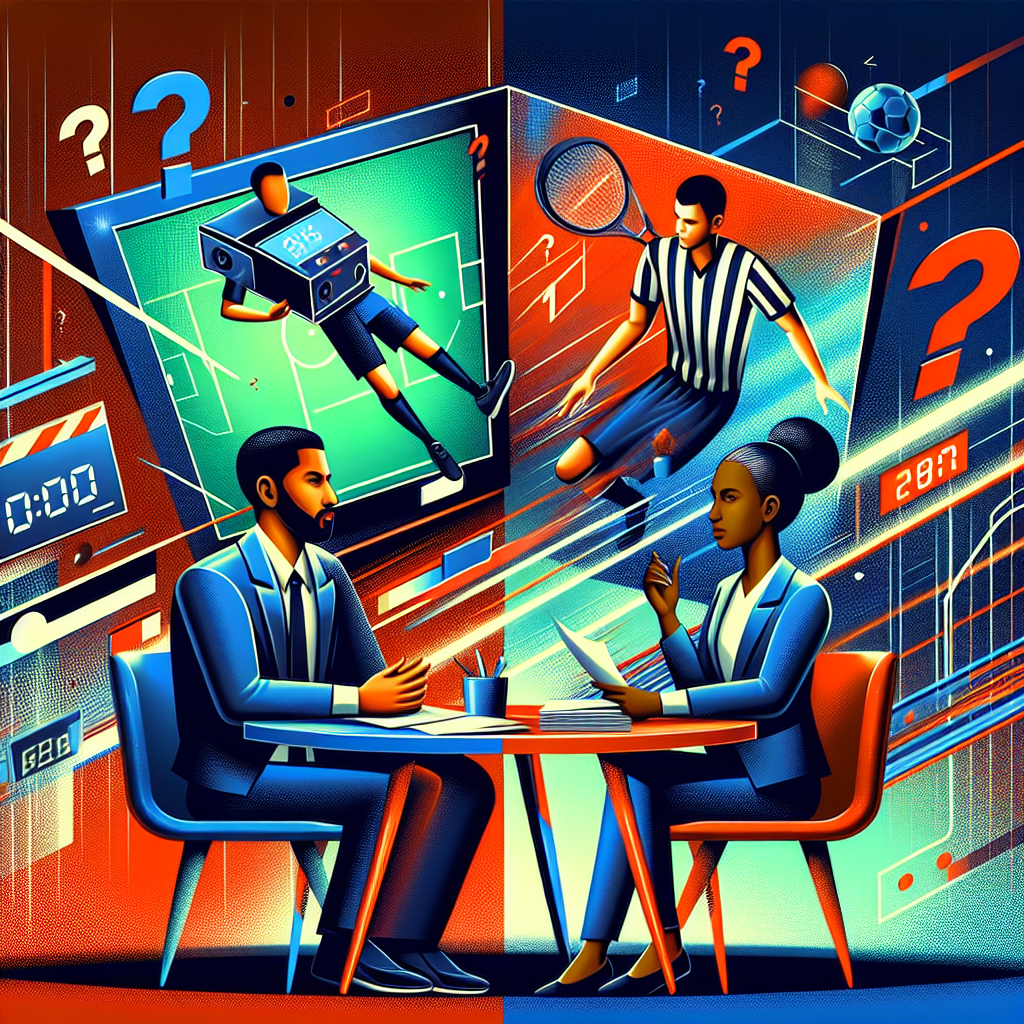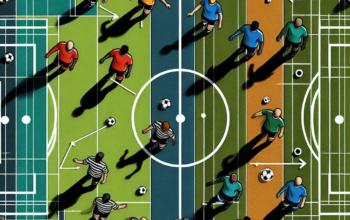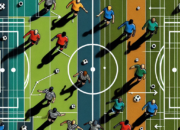Introduction
As we delve into the world of football in 2025, the discussions surrounding VAR (Video Assistant Referee) controversies have once again surged to the forefront of the beautiful game. With the increasing deployment of technology in sports, fans and analysts are increasingly vocal about decisions that have either vindicated or bewildered crowd sentiments. This article meticulously examines recent VAR controversies, outlining pivotal matches and decisions, the technology’s impact on the game, and the ongoing debates that shape our viewing experience.
Section 1: The Evolution of VAR in Contemporary Football
Since its implementation in 2018, VAR has drastically altered how football officiating operates. The primary aim was to reduce glaring errors during matches, ensuring that the critical moments are carefully reviewed before a decision is made. By 2025, VAR has become a defining feature in major leagues, from the Premier League to La Liga, and it continues to evolve to meet the expectations of fans and stakeholders alike. However, alongside its innovations, VAR has not been immune to controversy, with debates surrounding its efficacy and transparency often complicating its acceptance even among avid supporters.
One of the most significant changes in VAR protocols over the years has been the introduction of more collaborative decision-making among on-field referees and VAR officials. This evolution aims to address the isolation felt by VAR referees, who have often come under fire for overturning or confirming decisions without input from the match referee. Despite these improvements, many contend that the core issue remains: the interpretation of rules concerning offside calls, penalties, and the subjective nature of certain decisions continues to spark dissent. Recent notable incidents in the 2025 season serve as a vivid reminder of this ongoing struggle to balance technology with the human element of officiating.
Section 2: Recent Controversies that Rocked the Spiels
The year 2025 has not been devoid of controversy, with several matches igniting passionate debates among fans and pundits alike. One of the most notable incidents occurred during a highly anticipated fixture between Manchester United and Liverpool, where a crucial offside decision was called back after a lengthy VAR review. The decision to disallow a potential match-winning goal sparked outrage, with many voicing their frustrations on social media, insisting that the tech should have been equipped to provide a more precise evaluation. This scenario highlighted the tension between delivering an accurate outcome and the quick nature in which fans expect resolutions within the pulsating theater of football.
Additionally, the Serie A faced a similar dilemma during a match involving Juventus. After an apparent foul in the build-up to a critical goal, the VAR officials took over three minutes to arrive at a conclusion that baffled spectators: the goal was allowed. Subsequent analysis revealed divergent opinions on the reasoning behind maintaining the goal, fueling further discussions on VAR’s criteria for overturning decisions. This ongoing dissection illustrates a compelling point: technology in football is not merely designed to correct mistakes but also to amplify arguments concerning the game’s inherent aspects.
Section 3: The Role of VAR in Shaping Match Outcomes
The impact of VAR on match outcomes is profound, often determining the course of a season for teams at both ends of the table. In the 2025 season, the league table has already seen numerous shifts attributed to pivotal VAR interventions. With matches being decided on narrow margins, like when a last-minute goal was disallowed for offside after a VAR check, the psychological ramifications on players cannot be overlooked. Teams face an additional level of scrutiny, where every annotation is dissected, leading to pressure that can affect their performances in subsequent fixtures.
Moreover, the financial implications of VAR decisions extend beyond the pitch; teams vying for promotion or battling relegation face tangible consequences based on decisions that may appear arbitrary. The potential for a single VAR controversy to alter a team’s trajectory is immense. Clubs in their pursuit of European qualification are especially cognizant of how VAR can play a pivotal role in their playoff aspirations. It’s no longer just about winning; it’s about winning in the context of the broader implications that VAR decisions can bring to a club—significant ramifications that can reach into the millions when considering broadcasting rights, sponsorship, and fan engagement.
Furthermore, the emotional investment fans have in VAR decisions cannot be overstated. The technological aspect intended to enhance the match experience has, paradoxically, found itself at the heart of spectacle and drama. High-stakes matches now come with the added tension of waiting for the VAR signals announcing decisions, leaving fans on tenterhooks, often resulting in frenetic moods within stadiums. The palpable disappointment or jubilation surrounding these calls adds layers to the sporting drama and underscores the vital role that VAR continues to play in football’s evolving narrative.
Section 4: The Future of VAR in Football
As the debates surrounding VAR controversies continue, many stakeholders are calling for reforms to ensure the technology is utilized effectively. The future of VAR could involve enhanced transparency measures, including live broadcasting of VAR reviews to give fans a closer look at the decision-making process. This openness could bridge gaps between fans, officials, and players, fostering a deeper understanding of the complexities involved in the review process. Such adaptations may help mitigate the backlash that accompanies questionable decisions while also contributing to a richer overall viewing experience.
Another avenue for improvement could lie in advancing the technology itself. In 2025, there have been ongoing developments toward utilizing artificial intelligence and real-time data analytics for more accurate offside calls. Imagine a system that employs machine learning to analyze play patterns, making instantaneous decisions more reliable than they currently are. This technological advancement could reduce the waiting times for VAR interventions while maintaining accuracy, ensuring that the human element does not lose touch with an evolving game.
Moreover, education and training are paramount for refereeing staff. As the game turns increasingly technical, there’s a pressing need for officials to be trained not just in traditional officiating aspects but also in the nuances of technology involved in VAR. Equipping referees with the knowledge to better interpret technology and leverage it effectively will foster a culture of trust and competence. This change could be vital for the evolution of VAR as it continues to redefine the landscape of officiating standards in football.
Section 5: Fan Engagement and VAR Controversies
In the digital age, fan engagement has transformed drastically, especially concerning contentious VAR decisions. Social media platforms have become the battlegrounds for discussions, debates, and opinions regarding crucial calls, leading to a more closely knit community of football enthusiasts who actively partake in dissecting each incident. As fans rally to voice their insights, clubs and leagues alike are taking note, increasingly aware of the significance of public sentiment in their operational strategies. The ability to engage with fan frustrations and support can help shape club policies and league rules on VAR.
Moreover, the experience of attending matches has changed profoundly due to the integration of VAR. Crowds often erupt with both disdain and jubilation as they await the final call, transforming stadium atmospheres. Fan behavior has shifted from passive viewing to active participation, as they become integral components of the VAR experience itself. Clubs that recognize the importance of this dynamic may leverage these moments to forge deeper connections with their supporters, enhancing overall experiences and building brand loyalty.
Finally, the narrative shaped by VAR controversies extends beyond the immediate match context. They can influence cultural perceptions of clubs and leagues and even impact international tournaments. With each VAR incident, narratives evolve, creating defining moments in football history that fans recount for years to come. How clubs handle these contentious moments is critical; addressing fan concerns authentically can either strengthen relationships or exacerbate discord within soccer communities. Therefore, as we look forward, examining these trends will be vital in predicting the trajectory of VAR and its ramifications for the future of football.
Conclusion
In conclusion, VAR controversies in 2025 illuminate significant themes within football that speak to the ongoing evolution of officiating. The technology’s introduction was designed to enhance fairness, but controversial decisions demonstrate the complexities of implementing it effectively. While recent incidents remind us of the sharp divides it can create, there’s hope for improvements grounded in transparency and technology advancements. The relationship between VAR and football fans remains a dynamic one, rich with potential for both conflict and collaboration.
For the sport to thrive, ongoing discussions regarding these controversies are necessary to forge better pathways ahead. Only through rigorous debate, adaptive training, and technological innovation can VAR fulfill its promise as an integral companion to the beautiful game.
FAQs
What is VAR in football?
VAR, or Video Assistant Referee, is a technology used in football to assist referees in making accurate decisions during matches. It reviews key incidents such as goals, penalties, direct red cards, and mistaken identity through video replay.
Why do VAR controversies arise?
Controversies often arise due to subjective interpretations of rules, lengthy review processes, and communication breakdowns between officials and fans, causing dissatisfaction with certain decisions made on the field.
How has VAR changed the landscape of football officiating?
VAR has introduced a new layer of review that aims to minimize errors in officiating. It has also transformed how matches are watched, shifting the focus onto technology, updating the game for both fans and players.
What are the main criticisms of VAR?
Critics argue that VAR can interrupt the flow of the game, lead to confusion among spectators, and may not resolve all controversial decisions—often leading to debates about the accuracy of its reviews.
What future improvements are being considered for VAR?
Future improvements may include enhanced transparency, the application of advanced AI technologies for officiating, and improved training protocols for referees to better implement VAR in real-time situations.






